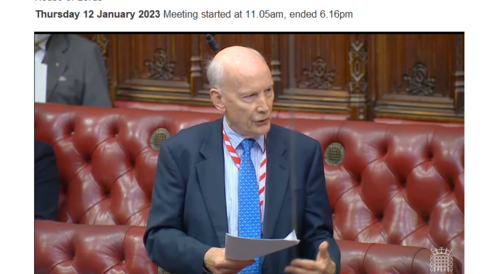
On the 12th of January 2023, Professor Lord Robert Mair CBE, Founding Head of CSIC at the University of Cambridge, contributed to the debate in the House of Lords onthe ‘Select Committee Report on Risk Assessment and Risk Planning’. TheReport was entitledPreparing for Extreme Risks: Building a Resilient Society published on 3rd December 2021 with the aim to “consider risk assessment and risk planning in the context of disruptive national hazards”. Lord Mair was a member of that Select Committee.
“The emphasis on risk assessment should increasingly be on preparedness and resilience. In the context of critical national infrastructure, innovative technologies now exist for obtaining the necessary data to achieve this. We are in a digital revolution". Professor Lord Robert Mair, Founding Head of CSIC
Opening his speech, Lord Mair said that he was pleased to see the Government’s positive response to the Report of the Select Committee on Risk Assessment and Risk Planning. He also welcomed a recent publication entitled The UK Government Resilience Frameworkand its particular emphasis on the key principle of strengthening resilience and risk assessment, which is at the core of the Report.In his introduction, Lord Mair highlighted “the essential need for preparedness and resilience” in the context of national infrastructure, and “the crucial role of new technologies and data in achieving this”.
To substantiate his argument, Lord Mair emphasised the cascading impact of infrastructure systems failure on essential services and the need to understand and assess the interdependencies that exist across risks to avoid “widespread devastation” for society. He drew attention to recent incidents such as the flooding in Lancaster during Storm Desmond in 2015, when the loss of electricity knocked out critical services in the hospital, schools and retail sectors.
Lord Mair went on to stress the importance of the availability of data to inform the level of infrastructure deterioration, in particular the need to equip key elements of infrastructure such as bridges with sensors to collect important information that makes it possible to assess risks and quantify the progress of infrastructure degradation. He drew attention to some tragic cases like the collapse of the Morandi Bridge in Genoa in 2018 and that of the I-35W Mississippi River Bridge in Minneapolis, Minnesota in 2007, which could have been prevented if more information were available. Lord Mair also referred to the independent review of the partial collapse of Toddbrook Reservoir in 2019, which concluded that “the dam spillway failure was due to both poor design and incomplete maintenance”.
Closing his speech, Lord Mair asked the Minister, Baroness Neville-Rolfe, to confirm if the Government was willing to support of the Select Committee’s recommendation for “the creation of an appropriate depreciation register for critical national infrastructure that identifies ageing infrastructure” (see paragraph 89 of the Report). Lord Mair stressed that “The emphasis on risk assessment should increasingly be on preparedness and resilience. In the context of critical national infrastructure, innovative technologies now exist for obtaining the necessary data to achieve this. We are in a digital revolution. … Combined with good modelling and ‘what if’ experiments, such technologies are a much-needed, cost-effective investment to improve the degree of preparedness and resilience relating to our critical national infrastructure”.
At the time of the debate, the Minister could not commit to Lord Mair’s suggestion regarding ‘the creation of an appropriate depreciation register’, but she confirmed that this recommendation will be kept under review.
- Watch the debate here (Lord Mair speech is at 5:14pm)
- Read the Hansard transcripts of the debate here
- Further Reading: Global Risks Report 2020
